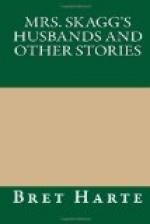A few days after this the editorial seclusion was invaded by voices of alternate expostulation and entreaty. Stepping to the door, the editor was amazed at beholding Mr. Morgan McCorkle, a well-known citizen of Angelo, and a subscriber to the “Record,” in the act of urging, partly by force and partly by argument, an awkward young man toward the building. When he had finally effected his object, and, as it were, safely landed his prize in a chair, Mr. McCorkle took off his hat, carefully wiped the narrow isthmus of forehead which divided his black brows from his stubby hair, and with an explanatory wave of his hand toward his reluctant companion, said, “A borned poet, and the cussedest fool you ever seed!”
Accepting the editor’s smile as a recognition of the introduction, Mr. McCorkle panted and went on: “Didn’t want to come! ’Mister Editor don’t went to see me, Morg,’ sez he. ‘Milt,’ sez I, ’he do; a borned poet like you and a gifted genius like he oughter come together sociable!’ And I fetched him. Ah, will yer?” The born poet had, after exhibiting signs of great distress, started to run. But Mr. McCorkle was down upon him instantly, seizing him by his long linen coat, and settled him back in his chair. “Tain’t no use stampeding. Yer ye are and yer ye stays. For yer a borned poet,—ef ye are as shy as a jackass rabbit. Look at ’im now!”
He certainly was not an attractive picture. There was hardly a notable feature in his weak face, except his eyes, which were moist and shy and not unlike the animal to which Mr. McCorkle had compared him. It was the face that the editor had seen at the window.
“Knowed him for fower year,—since he war a boy,” continued Mr. McCorkle in a loud whisper. “Allers the same, bless you! Can jerk a rhyme as easy as turnin’ jack. Never had any eddication; lived out in Missooray all his life. But he’s chock full o’ poetry. On’y this mornin’ sez I to him,—he camps along o’ me,—’Milt!’ sez I, ‘are breakfast ready?’ and he up and answers back quite peert and chipper, ’The breakfast it is ready, and the birds is singing free, and it’s risin’ in the dawnin’ light is happiness to me!’ When a man,” said Mr. McCorkle, dropping his voice with deep solemnity, “gets off things like them, without any call to do it, and handlin’ flapjacks over a cookstove at the same time,—that man’s a borned poet.”
There was an awkward pause. Mr. McCorkle beamed patronizingly on his protege. The born poet looked as if he were meditating another flight,—not a metaphorical one. The editor asked if he could do anything for them.
“In course you can,” responded Mr. McCorkle, “that’s jest it. Milt, where’s that poetry!”
The editor’s countenance fell as the poet produced from his pocket a roll of manuscript. He, however, took it mechanically and glanced over it. It was evidently a duplicate of the former mysterious contribution.




